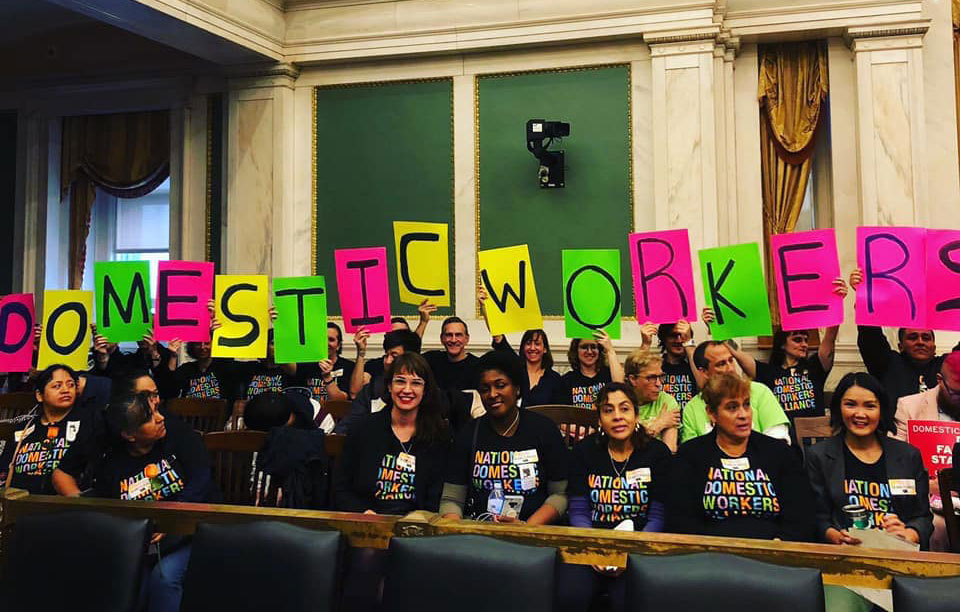
I have been a domestic worker my whole life.
I work in other people’s homes, mostly as a nanny, but I’ve also been a homecare worker, taking care of people who are elderly and need assistance, and have chosen to stay in their homes as they age. I’m a cook, preparing meals. I’m a teacher, reading stories to their children. I’m a nurse, monitoring medication. And I’m a companion, keeping someone company when it is too difficult for them to leave their home.
Because of my services, parents can go to work and continue their careers even as they grow their families, and the children of parents who are elderly can be reassured they are aging safely and gracefully in their homes, without needing to leave the workforce to ensure they are taken care of in their later years.
But despite my work being to take care of others’ loved ones — just like a doctor or teacher does in a hospital or a school — my work in the home has never been treated with the same respect as those who work outside the home.
The reality of domestic work is very difficult. When I’m sick and can’t work, I am not paid for the hours I can’t work. Even when I’m sick because I caught an illness from my employer or their children, I don’t receive any income for the time that I am unwell. When my employer takes a week of vacation and doesn’t need any childcare, I don’t receive any income for that week, even though that was income I rely on. When an employer decides they don’t need my services anymore they let me go without notice, and I have to scramble to find my next source of income so I can provide for my own two children, too.
The conditions of domestic work are not new. These conditions don’t exist because domestic work is unskilled — it is highly skilled work — and they certainly don’t exist because domestic workers are “okay” with working this way. They exist because domestic work sits at the intersection of the issues of race, gender and immigration, and this work carries the legacy of generations of discrimination and devaluation.
Domestic work has always been considered “women’s work”, and as a result it is not valued as professional or skilled. Some of the first domestic workers were enslaved Black women, taking care of the families of slave-owners and their homes. And so, even as the domestic work profession grew, domestic workers continued to be undervalued, underpaid, and vulnerable to harassment, discrimination, wage theft, and unfair dismissal, with no recourse.
When the worker rights and protections of the New Deal were passed in the 1930s, domestic workers were specifically excluded from these rights as a concession to southern lawmakers. As a result, domestic workers have worked without the right to a minimum wage, without the right to overtime, without the right to form a union, and without protection from harassment and discrimination, for generations. And as the U.S. domestic workforce of more than 2 million workers is 90 percent women, disproportionately women of color and immigrants, domestic workers have remained some of the most vulnerable workers in the US.
But that is beginning to change. In Philadelphia, where I have worked for the last 15 years, nannies, house cleaners, and home care workers with the Pennsylvania Domestic Workers Alliance, part of the National Domestic Workers Alliance, have been organizing for the Domestic Workers Bill of Rights for more than a year. Last week, the bill was unanimously approved by Philadelphia City Council.
This bill is a historic piece of legislation that extends rights and protections to the 16,000 domestic workers in Philadelphia, including requiring employers to provide benefits for domestic workers, so that people like me can take a day off when we are too sick to work, without suffering the financial impact of losing a day’s pay. When the bill goes into effect in six months, domestic workers in Philadelphia will have rights that they have never had before, changing the conditions of work for domestic workers for generations to come.
I love being a nanny. I love feeling energized with the kids, playing with them and teaching them. I know I make an impact on their lives, and I know that the families I work for rely on my contributions. I do the work that makes all other work possible. And I deserve to be respected at my workplace — which is others’ homes — and to receive the same rights and protections that other workers receive.
Because not everyone can be a doctor or a teacher, but most doctors and teachers need someone like me to take care of the work they leave behind in their home.
Our most important fundraising appeal of the year
December is the most critical time of year for Truthout, because our nonprofit news is funded almost entirely by individual donations from readers like you. So before you navigate away, we ask that you take just a second to support Truthout with a tax-deductible donation.
This year is a little different. We are up against a far-reaching, wide-scale attack on press freedom coming from the Trump administration. 2025 was a year of frightening censorship, news industry corporate consolidation, and worsening financial conditions for progressive nonprofits across the board.
We can only resist Trump’s agenda by cultivating a strong base of support. The right-wing mediasphere is funded comfortably by billionaire owners and venture capitalist philanthropists. At Truthout, we have you.
We’ve set an ambitious target for our year-end campaign — a goal of $250,000 to keep up our fight against authoritarianism in 2026. Please take a meaningful action in this fight: make a one-time or monthly donation to Truthout before December 31. If you have the means, please dig deep.